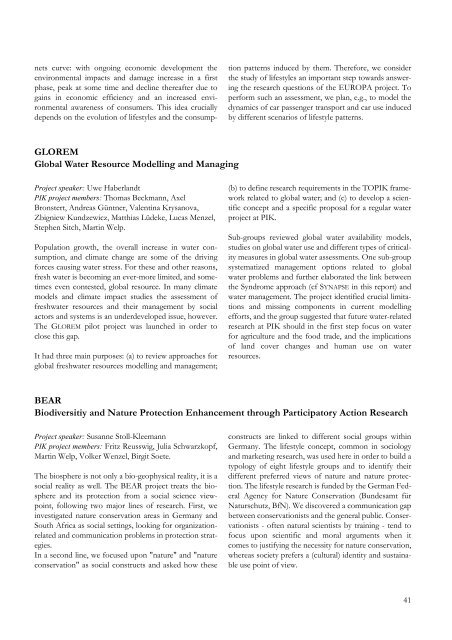PIK Biennial Report 2000-2001 - Potsdam Institute for Climate ...
PIK Biennial Report 2000-2001 - Potsdam Institute for Climate ...
PIK Biennial Report 2000-2001 - Potsdam Institute for Climate ...
You also want an ePaper? Increase the reach of your titles
YUMPU automatically turns print PDFs into web optimized ePapers that Google loves.
nets curve: with ongoing economic development the<br />
environmental impacts and damage increase in a first<br />
phase, peak at some time and decline thereafter due to<br />
gains in economic efficiency and an increased environmental<br />
awareness of consumers. This idea crucially<br />
depends on the evolution of lifestyles and the consump-<br />
GLOREM<br />
Global Water Resource Modelling and Managing<br />
Project speaker: Uwe Haberlandt<br />
<strong>PIK</strong> project members: Thomas Beckmann, Axel<br />
Bronstert, Andreas Güntner, Valentina Krysanova,<br />
Zbigniew Kundzewicz, Matthias Lüdeke, Lucas Menzel,<br />
Stephen Sitch, Martin Welp.<br />
Population growth, the overall increase in water consumption,<br />
and climate change are some of the driving<br />
<strong>for</strong>ces causing water stress. For these and other reasons,<br />
fresh water is becoming an ever-more limited, and sometimes<br />
even contested, global resource. In many climate<br />
models and climate impact studies the assessment of<br />
freshwater resources and their management by social<br />
actors and systems is an underdeveloped issue, however.<br />
The GLOREM pilot project was launched in order to<br />
close this gap.<br />
It had three main purposes: (a) to review approaches <strong>for</strong><br />
global freshwater resources modelling and management;<br />
tion patterns induced by them. There<strong>for</strong>e, we consider<br />
the study of lifestyles an important step towards answering<br />
the research questions of the EUROPA project. To<br />
per<strong>for</strong>m such an assessment, we plan, e.g., to model the<br />
dynamics of car passenger transport and car use induced<br />
by different scenarios of lifestyle patterns.<br />
(b) to define research requirements in the TO<strong>PIK</strong> framework<br />
related to global water; and (c) to develop a scientific<br />
concept and a specific proposal <strong>for</strong> a regular water<br />
project at <strong>PIK</strong>.<br />
Sub-groups reviewed global water availability models,<br />
studies on global water use and different types of criticality<br />
measures in global water assessments. One sub-group<br />
systematized management options related to global<br />
water problems and further elaborated the link between<br />
the Syndrome approach (cf SYNAPSE in this report) and<br />
water management. The project identified crucial limitations<br />
and missing components in current modelling<br />
ef<strong>for</strong>ts, and the group suggested that future water-related<br />
research at <strong>PIK</strong> should in the first step focus on water<br />
<strong>for</strong> agriculture and the food trade, and the implications<br />
of land cover changes and human use on water<br />
resources.<br />
BEAR<br />
Biodiversitiy and Nature Protection Enhancement through Participatory Action Research<br />
Project speaker: Susanne Stoll-Kleemann<br />
<strong>PIK</strong> project members: Fritz Reusswig, Julia Schwarzkopf,<br />
Martin Welp, Volker Wenzel, Birgit Soete.<br />
The biosphere is not only a bio-geophysical reality, it is a<br />
social reality as well. The BEAR project treats the biosphere<br />
and its protection from a social science viewpoint,<br />
following two major lines of research. First, we<br />
investigated nature conservation areas in Germany and<br />
South Africa as social settings, looking <strong>for</strong> organizationrelated<br />
and communication problems in protection strategies.<br />
In a second line, we focused upon "nature" and "nature<br />
conservation" as social constructs and asked how these<br />
constructs are linked to different social groups within<br />
Germany. The lifestyle concept, common in sociology<br />
and marketing research, was used here in order to build a<br />
typology of eight lifestyle groups and to identify their<br />
different preferred views of nature and nature protection.<br />
The lifestyle research is funded by the German Federal<br />
Agency <strong>for</strong> Nature Conservation (Bundesamt für<br />
Naturschutz, BfN). We discovered a communication gap<br />
between conservationists and the general public. Conservationists<br />
- often natural scientists by training - tend to<br />
focus upon scientific and moral arguments when it<br />
comes to justifying the necessity <strong>for</strong> nature conservation,<br />
whereas society prefers a (cultural) identity and sustainable<br />
use point of view.<br />
41

















